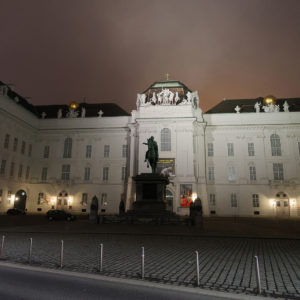VIENNA — In response to the nerve-agent attack in the United Kingdom, more than 150 Russian “diplomats” have been expelled from 28 countries — with a notable exception of Austria.
So how come its capital, often mocked as Europe’s espionage theme park, is immune from the recent rash of East-West ejections?
A whopping 7,000 agents representing every kind of interest are active here, according to Siegfried Beer, a leading expert in espionage and terrorism at Graz University.
The Russian Embassy has a total staff of up to 1,000, twice as large as the U.S. Embassy with 525 personnel in a posting where the whole diplomatic corps is inflated for a nation of only 8.8 million.
This is, in part, because a plethora of international organizations has settled in the city, notably sections of the United Nations, OPEC, the Atomic Energy Agency, the Organization of Security and Co-operation in Europe, and it is also a convenient locale for conferences such as the Iran nuclear negotiations. The latter notable for a photo of then State Secretary John Kerry making a park bench call to Washington because his hotel’s telephones had been well and truly bugged.
Although there is plenty of scope for reciprocal expulsions, the paradox of Europe’s espionage hub being untroubled by the diplomatic eruption isn’t complicated.
First, the idea of Austria, the alpine nation between Germany, Switzerland and Hungary as a West-East mediator is hard-wired into its political identity, Left and Right. “Austria won’t take any national measures,” Chancellor Sebastian Kurz said in response to news questions. “Austria is a neutral country and sees itself as a bridge-builder between both sides.”
This was echoed by Foreign Minister Karin Kneissl, a former Fulbright Fellow who works in five languages, including Arabic. He also favors “an active policy of mediation.”
In other words, if there’s no tit, there’s no tat, so Vienna shrugs an elegant shoulder at fetid foreign intrigues in its midst. Business as usual.
Second, Vladimir Putin is scheduled to visit in June, his first trip to a European Union member country since he was re-elected Russia’s president last month. Mindful of their dependence on Russia’s gas supplies, the Austrians won’t put a dog in the fight over a poisoned spy.
With a diplomatic Cold War in prospect and depleted East-West intelligence capacities now widespread, anonymous sources suggest there will be a re-energized focus on Vienna by foreign spooks.
Political intelligence ebbs and flows with the hotspots of the Balkans to the south, the Ukraine, former Soviet satellites and, of course, the Middle East — all short hauls from Austria.
The need for high-tech, industrial, energy and economic secrets is constant, while military intelligence remains premium traffic. For instance, the U.S. Navy traitor John Walker became very familiar with Vienna’s alleys during his 20 years of selling secrets to the Soviets, aided by a KGB guide titled “The Vienna Procedure.”
Green Party MP Peter Pilz remains indignant about the “shameless, illegal spying and surveillance” mainly by Americans, British and Germans, but his is a lonely voice.
If they care at all, locals can dial up a list of the top 10 “treffpunkt” (meeting places), for espionage contacts past and present. The American Bar, near the famous Opera House, was a Cold War favorite; the Imperial Hotel and the Schonbrunn Palace’s magnificent estate are not above suspicion.
My own — unlisted — favorite is yards from Vienna’s most expensive shopping. Called Gutruf, meaning “of good repute” — which rather overstates the case. As smoking is permitted, the ill-lit interior resembles a marinated shoe box and its “kitchen” is a microwave on the counter. It was here my host operated on behalf of East German spymasters, his cheerful beer-serving remembered yet.
The spurious glamour of such venues partly derives from the darkness of four-power occupied Vienna conjured by “The Third Man” (1949), starring Orson Welles and Joseph Cotton, which is permanently showing in the Burg Kino. “Truth in art and truth in life are not the same thing,” former CIA officer and spy novelist Charles McCarry puts it.
Austrian neutrality sensitivities prevent a spy museum like those in Washington, New York or Berlin, but it wouldn’t lack for exhibits or history.

